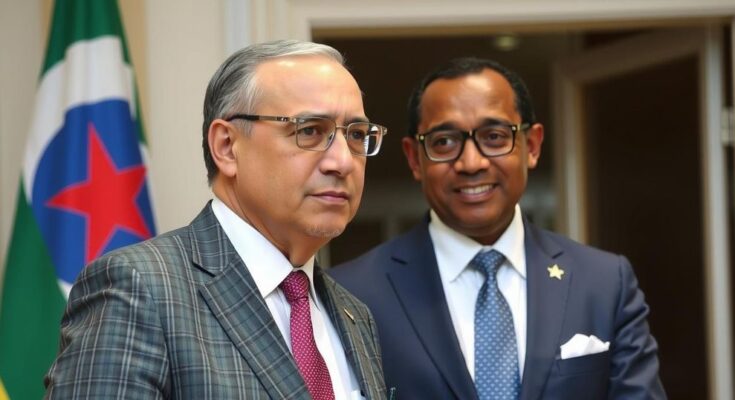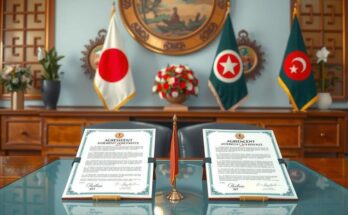Somalia’s President Hassan Sheikh Mohamud has traveled to Turkey for mediation talks with Ethiopia’s PM Abiy Ahmed, organized by Turkish President Recep Tayyip Erdoğan. This marks his first participation after prior attempts failed. The discussions are prompted by heightened tensions surrounding Ethiopia’s agreement with Somaliland, raising significant sovereignty concerns for Somalia. Negotiations aim to ease animosity and explore collaborative solutions to regional security issues, including the fight against Al-Shabaab.
President Hassan Sheikh Mohamud of Somalia has departed for Turkey to engage in mediation talks with Ethiopian Prime Minister Abiy Ahmed, as confirmed by state media. This marks President Mohamud’s inaugural attendance at these discussions following failed previous attempts. Turkish President Recep Tayyip Erdoğan is facilitating the negotiations, aiming to bridge the gap between the two nations amidst continuing tensions over Ethiopia’s controversial agreement with the breakaway Somali region of Somaliland.
The upcoming talks, scheduled to take place in Ankara, represent a critical opportunity for dialogue, with the backdrop of Ethiopia’s MoU with Somaliland granting Ethiopia access to the Red Sea. This agreement has heightened tensions between Somalia and Ethiopia, as it undermines Somalia’s sovereignty. Although Somalia initially demanded the withdrawal of this agreement prior to negotiations, the talks will proceed despite the existing friction. Notably, Somalia has chosen to refrain from participating in the newly established African Union Support and Stabilization Mission in Somalia, seeking instead to place Egypt in command of the mission, which they perceive as a measure against Ethiopia’s influence. Conversely, Ethiopia has reiterated its commitment to aiding Somalia in combating Al-Shabaab, further complicating the already complex dynamics between the two nations.
The talks come in the wake of Somalia’s repeated accusations against Ethiopia regarding arming local militias, particularly in Jubaland. However, regional authorities have countered these allegations, insisting that Ethiopian forces are not mobilizing in support of the local fighting. The outcome of this diplomatic engagement remains to be seen, as both parties navigate the intricate landscape of regional politics.
The current diplomatic engagement between Somalia and Ethiopia is rooted in longstanding tensions fueled by a recent MoU between Ethiopia and Somaliland, which has significantly strained relations. The agreement, effective from January 1, 2023, entailed Ethiopia gaining access to the Red Sea in return for recognizing Somaliland’s sovereignty, a move Somalia perceives as a violation of its territorial integrity. Previous attempts at negotiations faltered, necessitating this latest mediation effort led by Turkey, reflecting the complexities of regional dynamics and the importance of international mediation in resolving disputes. As a result, Somalia’s decision to distance itself from the African Union’s peacekeeping mission, preferring Egyptian leadership, signals a clear strategy to assert its sovereignty while maintaining leverage over its relations with Ethiopia, which continues to assert its role in regional stability. The outcomes of the impending talks will not only influence bilateral relations but also impact the broader security posture in the region, particularly regarding the ongoing threat from militant groups like Al-Shabaab.
In summary, President Hassan Sheikh Mohamud’s visit to Turkey is a critical step toward addressing the strained relations between Somalia and Ethiopia. As the two leaders prepare to engage in dialogue, the backdrop of a controversial agreement with Somaliland complicates the discussions. Turkey’s role as mediator underscores the significance of international involvement in resolving regional conflicts. The forthcoming talks are pivotal in shaping future relations and ensuring stability in the Horn of Africa amidst ongoing security concerns.
Original Source: www.garoweonline.com




